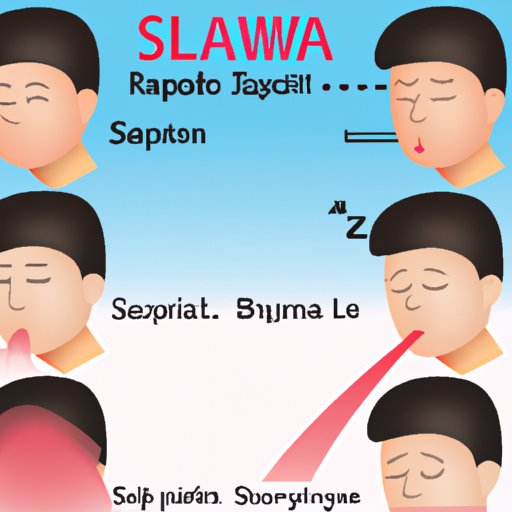Introduction
Saliva is a clear liquid produced in the mouth that helps break down food, lubricates the mouth, and protects against infection. Although saliva is generally beneficial for the body, it can be problematic during sleep. Excessive saliva production, also known as sialorrhea or ptyalism, can lead to uncomfortable nights and poor sleep quality. In this article, we’ll discuss tips and strategies for how to stop saliva production while sleeping.
Sleep on Your Back
Sleeping on your back is one of the best ways to reduce saliva production at night. When you lie on your back, gravity helps keep your tongue from falling back into your throat and blocking your airway. This decreases the likelihood of saliva pooling in the back of your mouth and spilling out while you sleep.
Here are some tips for making sleeping on your back more comfortable:
- Invest in a high-quality mattress and pillow that provide optimal support and comfort.
- Place a pillow beneath your knees to help relieve pressure on your lower back.
- Adjust the room temperature so that it isn’t too hot or cold.

Avoid Foods and Drinks that Trigger Saliva Production
Certain foods and drinks can trigger an increase in saliva production. Examples include spicy foods, acidic foods, carbonated beverages, and sugary snacks. If you find yourself producing excessive saliva while sleeping, it’s a good idea to avoid such items before bedtime.
Instead of these foods and drinks, try eating a light snack such as a piece of fruit or a handful of nuts. You could also sip on a cup of herbal tea, which may help relax your mind and body and make it easier to fall asleep.
Chew Sugar-Free Gum or Suck on a Hard Candy Before Bed
Chewing sugar-free gum or sucking on a hard candy before bed can help reduce saliva production at night. The act of chewing stimulates the salivary glands, causing them to produce more saliva. However, once the gum or candy is finished, the glands will stop producing saliva and you should experience less saliva throughout the night.
When choosing a gum or candy, look for ones that are sugar-free or made with natural sweeteners. Additionally, avoid gums or candies that contain citric acid, as this can irritate the mouth and stimulate saliva production.

Keep Your Mouth Closed When You Sleep
Keeping your mouth closed when you sleep can help reduce saliva production. When your mouth is open, saliva can pool up in the back of your throat and spill out while you sleep. On the other hand, keeping your mouth closed prevents saliva from escaping and reduces the amount of saliva you produce at night.
If you have trouble keeping your mouth closed while you sleep, there are a few strategies you can try. For example, you can keep a water bottle next to your bed and take a few sips whenever your mouth starts to feel dry. You can also try taping your lips shut with medical tape, although this should only be done under the supervision of a doctor.

Use a Saline Nasal Spray
Using a saline nasal spray can help reduce saliva production during sleep. Saline sprays work by thinning the mucus in your nose, which can help reduce the sensation of a dry mouth. Additionally, they can help flush away any debris that may be blocking your nasal passages, allowing you to breathe more easily.
To use a saline nasal spray, first blow your nose to remove any excess mucus. Next, tilt your head back slightly and place the nozzle of the spray into one of your nostrils. Finally, press the trigger to release the spray and then repeat the process in your other nostril.
Try Sleeping with a Slightly Elevated Head Position
Sleeping with a slightly elevated head position can also help reduce saliva production. When your head is raised, it allows saliva to drain away from your mouth and throat instead of pooling in the back of your throat. This can help reduce the amount of saliva spilled out while you sleep.
To find the optimal head position, experiment with different angles until you find one that is comfortable yet still slightly elevated. You may also want to invest in a wedge pillow, which can help keep your head and neck in the correct position.
Conclusion
Excessive saliva production can make it difficult to get a good night’s sleep. Fortunately, there are several tips and strategies that can help reduce saliva production while sleeping. These include sleeping on your back, avoiding certain foods and drinks, chewing sugar-free gum or sucking on a hard candy, keeping your mouth closed, using a saline nasal spray, and sleeping with a slightly elevated head position.
By following these tips, you should be able to reduce saliva production and enjoy more comfortable, restful nights of sleep.


